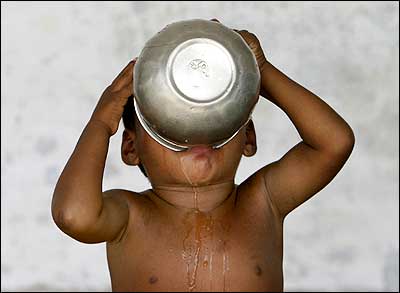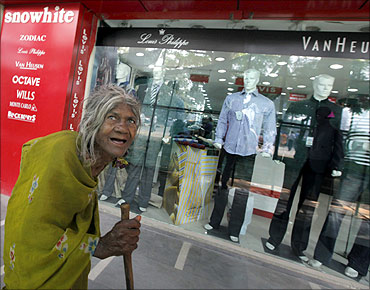
'I don't think at any stage the government was honest in its approach. It had simply worked and reworked the Food Security Bill keeping the 2014 election in mind.'
There is so much of hype and expectation from the proposed National Food Security bill that I have begun to fear for the hungry millions.
For a country which has the largest population of hungry and malnourished in the world, I was expecting a sensible piece of legislation, which looks beyond immediate political gains, to build up a society that does not have to depend upon food doles so as to emerge free from the clutches of hunger in the long run.
The proposed bill aims at providing highly subsidised grains to 67 per cent of the population to begin with. In the years to come, I am sure the coverage under the food security programme would be further extended.
Even before the bills make a provision for supplying grains at Rs 3/2/1 for rice/wheat/millets to the eligible households, some states have already moved in with universal distribution of rice at Rs 1/kg as in Tamil Nadu, to an equally attractive roti-dal scheme in Punjab, and more lately Tamil Nadu going a step ahead by offering Idli/Sambhar/Curd rice at a phenomenally low price.
If it is a one-time entitlement, I can understand the political logic. But don't we remember the age-old Chinese adage: If you want to feed a man for a day, give him fish. But if you want to feed him for lifetime, teach him how to catch fish.
For a country which ranks 66 among 105 countries in the latest Global Hunger Index rankings, and which has a deplorable 47 per cent of the children under 5 living in acute malnutrition, Sonia Gandhi's resolve to have a legally-binding legislation on food security certainly provided a historic opportunity.
But looking at what is available in the public domain, I must acknowledge it is an opportunity lost.
First, the National Advisory Council repackaged the public distribution system in a new format, and then the continuing wrangling between the concerned ministries only showed how myopic our thinking is.
Simply by putting the old wine in a new bottle and adding a couple of legal provisions will not provide freedom from hunger.
Let us not forget, the Integrated Child Development Scheme as well as MNREGA have legal provisions which have failed to deliver. Legal entitlement alone cannot serve as a guarantee.
For a country as diverse as India, a one size fits all approach will not work. It has to be a multi-pronged approach.
First and foremost, it has to be acknowledged that the artificially stringent poverty Planning Commission comes up with is actually the food insecure line. At Rs 28.65 per capita daily consumption in cities and Rs 22.42 in rural areas it is not possible to buy two square meals a day.
These are the people who need emergency food aid.
For the 77 per cent population that the Arjun Sengupta Committee had categorised in the report of the National Commission for Enterprise in the Unorganised Sector, a different approach to address food security concerns need to be put in place.
In essence, what India needs is not one, but two lines that makes a clear distinction between the acute hungry and the poor. The approach to address hunger should be different for both the categories.
...

Over 550,000 villages of India's total 638,000 villages produce food crops. Most of these villages have something to sell in the market. How come a number of people go to bed hungry in the same village that produces enough food?
Why can't a food security system be launched that takes care of the hungry in the same villages (or a cluster of villages) that produce surplus food?
Even in the heart of the hunger belt of Kalahandi in Odisha I have seen villages which have not faced hunger for several decades now. These are the villages which have small traditional foodgrain banks and have operationalised a system of sharing and caring which has worked successfully over time.
The Gola system in Bihar is another well-known example. I know scores of such villages across the country where hunger is by and large history.
It is not difficult to redesign a national programme that makes India's villages self-reliant in food security. This will not only reduce the dependence on public distribution system, but also restrict the massive financial outgo year after year.
Instead of keeping almost a quarter of the population dependent upon food doles every year, such a programme will prepare poor households to take care of their own hunger.
At the same time, what is not being told is whether the proposed bill will reduce the number of hungry in the years to come.
With 14.5 million farmers quitting agriculture between 2004-2005 and 2009-2010, and another 5 million jobs in manufacturing sector lost in the same period, I fear the percentage of people depending on monthly rations will grow with every passing year.
The proposed Food Security Bill has to be seen in the light of several policy changes that are being simultaneously brought in.
To begin with, the government proposes to introduce cash-for-food before the 2014 election. This little understood proposal is being timed with a food ministry suggestion of capping food procurement.
In addition, the Food Corporation of India is being asked to abandon its sovereign role and instead venture into commodity trading (See my analysis: https://devinder-sharma.blogspot.in/2013/05/cash-for-food-will-strike-at-very.html).
What India needs is a hunger programme that ensures food security at the household and village level.
Food security cannot be ensured without suitably modifying economic policies in agriculture, rural development, science and technology and international trade.
I find no such effort being made. In fact, these policies run counter to the massive hunger programme being re-launched. Any meaningful food security programme should aim at gradually reducing the number of hungry dependent on government support. This is only possible if the government had looked at the entire issue in a sincere and holistic manner.
I don't think at any stage the government was honest in its approach. It had simply worked and reworked the Food Security Bill keeping the 2014 election in mind.